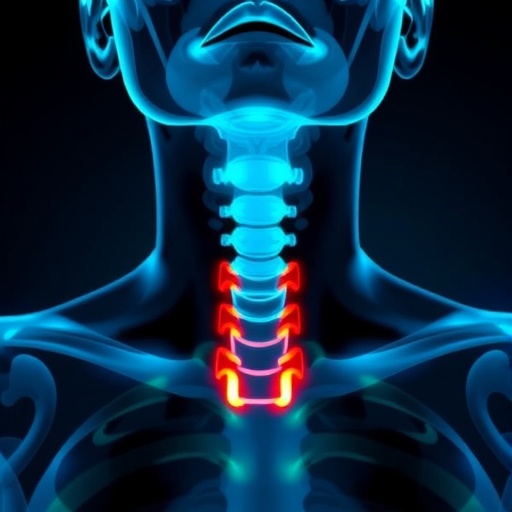In recent years, the understanding of perioperative experiences in patients with thyroid cancer has gained significant traction within the medical community. A groundbreaking study conducted by a team of researchers, including Yin, Fang, and Sheng, has revealed deep insights into the symptoms experienced by patients before and after thyroid surgery. This substantial research effort, published in the journal BMC Endocrine Disorders in 2025, highlights the complexity of managing thyroid cancer—a condition that affects millions worldwide—and underlines the necessity of addressing both the physical and psychological dimensions of patient care.
Thyroid cancer is not merely a solitary entity; it manifests in various forms, necessitating an interdisciplinary approach to treatment. The perioperative period, encompassing the time leading up to, during, and following surgical intervention, is particularly crucial in determining patient outcomes. In their analysis, the research team employed advanced network analysis techniques to examine the interplay between various symptoms and how these affect the overall quality of life in patients diagnosed with this malignancy. By combining cross-sectional and longitudinal data, they provided a comprehensive overview of symptomatology that is often overlooked in traditional studies.
It’s essential to appreciate that patients undergoing thyroid surgery often experience diverse symptoms that can significantly impact their recovery trajectory. These symptoms can be psychological, such as anxiety and depression, or physical, including pain and fatigue. The convergence of these experiences has been meticulously documented in this study, painting a detailed picture of what patients contend with. The researchers underscored that this multifaceted symptomatology calls for integrative care strategies that address the spectrum of challenges faced by these individuals.
One of the most compelling aspects of the research is the emphasis on longitudinal data. By tracking patients over an extended period, the authors were able to observe changes and trends in symptom experiences, which could otherwise be missed in cross-sectional snapshots. Understanding how symptoms evolve from preoperative phases to postoperative recovery is invaluable. It allows healthcare providers to anticipate challenges and tailor interventions that could ameliorate these symptoms, leading to improved patient outcomes and satisfaction.
Preoperative counseling has emerged as a vital component of thyroid cancer management. The findings of this study suggest that thorough communication about potential symptoms and realistic recovery expectations can significantly influence a patient’s emotional state pre-surgery. Preparing patients for the journey they are about to embark on, including potential discomfort and emotional turbulence, fosters a partnership in care that is often pivotal in enhancing recovery. As more healthcare professionals recognize this, we may see an evolving landscape in patient education and preoperative care protocols.
Moreover, the study also delves into the psychological ramifications of thyroid cancer and its treatment. The emotional burden associated with cancer diagnosis and treatment should not be underestimated. Anxiety and depression frequently accompany the physical symptoms, complicating recovery and potentially leading to detrimental outcomes. The authors effectively argue that a holistic approach to patient care, one that includes mental health support, is imperative in addressing these intertwined challenges.
Given their findings, the researchers recommend the incorporation of mental health assessments into routine preoperative evaluations for patients with thyroid cancer. This recommendation aligns with growing evidence supporting the role of psychological health in chronic illness management. Implementing such assessments may seem daunting within busy clinical schedules; however, leveraging multidisciplinary teams could facilitate this integration, ensuring that both physical and emotional needs are met.
As the prevalence of thyroid cancer continues to increase, understanding the nuances of perioperative symptoms becomes even more critical. The insights provided by Yin and colleagues underscore the need for further research in this area. Tailoring postoperative care and follow-up assessments based on individual symptom experiences could lead to more personalized and effective treatment strategies.
The significance of this research extends beyond thyroid cancer alone. It serves as a model for how we might approach similar challenges in other cancer types and surgical interventions. The integration of network analysis within clinical research can illuminate patterns and interactions that are not readily apparent, leading to more thorough understanding and improved care across diverse patient populations.
In conclusion, the study of perioperative symptoms in patients with thyroid cancer opens up new avenues for enhancing patient-centered care. The comprehensive analysis by Yin, Fang, Sheng, and their team presents a clarion call for the healthcare community to evolve beyond traditional methodologies. As we embrace this information, patients may experience more nuanced and supportive care throughout their cancer journeys, rendering their battles against thyroid cancer less isolating and more manageable.
The ongoing dialogue within the medical community sparked by such research is crucial. As more studies emerge and methodologies become refined, the focus will rightly shift to collaborative care models that prioritize the full spectrum of patient experience. The interplay between physical and emotional wellbeing shouldn’t just be recognized; it should be actively addressed to foster recovery and resilience in patient populations facing cancer.
The findings of this study are destined to influence clinical practices and educational endeavors in the context of thyroid cancer. As discussions continue, there lies a persistent hope that these insights will spearhead initiatives that enhance patient care, ensuring that no aspect of the cancer journey is overlooked. With concerted efforts and a focus on holistic treatment, the battle against thyroid cancer can evolve into a more compassionate and effective endeavor.
Subject of Research: Perioperative symptoms in patients with thyroid cancer
Article Title: Perioperative symptoms in patients with thyroid cancer: a cross-sectional and longitudinal network analysis
Article References:
Yin, Y., Fang, Z., Sheng, X. et al. Perioperative symptoms in patients with thyroid cancer: a cross-sectional and longitudinal network analysis. BMC Endocr Disord 25, 211 (2025). https://doi.org/10.1186/s12902-025-02032-w
Image Credits: AI Generated
DOI: 10.1186/s12902-025-02032-w
Keywords: thyroid cancer, perioperative symptoms, patient care, network analysis, mental health, comprehensive care




